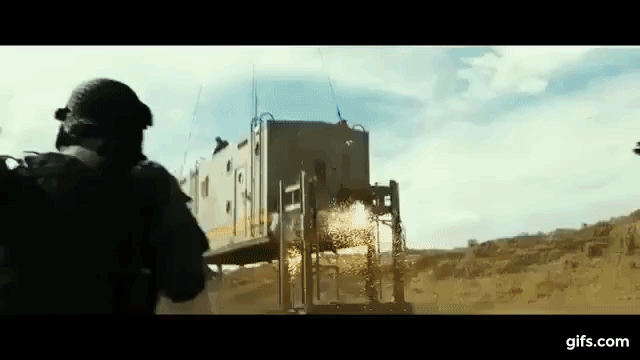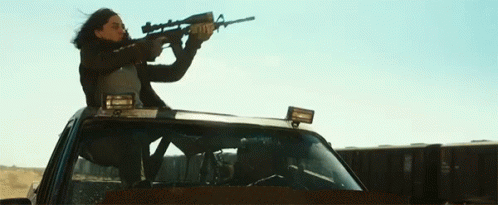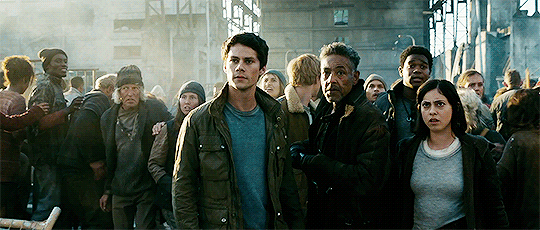***NO SPOILERS FOR THE DEATH CURE, BUT SPOILERS FOR THE PREVIOUS MAZE RUNNER FILMS ABOUND WITHIN. YOU'VE BEEN WARNED.***
Well, actually, you kinda
have seen it before. All of it, in some form or another. But still, this third and final entry in the
Maze Runner trilogy feels no less fresh and powerful than any of its predecessors - and, in quite a few ways, outdoes its predecessors pretty neatly. Almost two and a half hours go by fast in this movie that resembles the love child of
Logan, Blade Runner 2049, and
Mockingjay, with perhaps the greatest payoff in that it's the closest thing this trilogy has to an
Amazing Spider-Man or
Logan-grade broad-spectrum emotional experience. Not to say, of course, that it isn't such an experience, but
The Death Cure will make your heart race for those two and a half hours and then make you cry buckets right at the end and that's a promise.
 |
| "We're all bloody inspired." |
Though not 100% true to the source material, that's no surprise since none of the books are. I'd say the first film was about 75% true, and
The Scorch Trials about 20% - actually to its benefit in my mind, because of the increase in action.
The Death Cure returns back to something more towards the first film's trueness-to-the-book spectrum - more like 60%, but that sixty is the parts that really count the most. Like, for instance, a few of the original book's more infamous moments, but also the heavy focus on the world's "Last City," all WCKD-controlled. Just as in the book, the Last City is basically Denver, according to the map that Thomas rolls out in one early scene, as well as the fact that there's at least one Colorado license plate visible. The city itself looks very much like a mashup of Hong Kong and a futuristic San Francisco-Gotham thing, just smack dab in the Rocky Mountain foothills, which in this post-apocalypse look more like the chapparal scrublands around Los Angeles. Makes sense since the movie was filmed largely in Cape Town, which I understand has a very similar climate to most of California.
 |
| Speaking of SF, I couldn't help but think of this recent semi-viral shot while seeing the Last City. |
I'm actually a tad bit disappointed that, being filmed in Cape Town, this one kept more than a bit of the second movie's desert aesthetic. One part of the fun for me about the original trilogy was how each book's aesthetic reflected a different biome - jungle in Book 1, desert in Book 2, mountain in Book 3. Hell, I even predicted in the run-up to the initial filming of
The Death Cure that they'd shoot in Vancouver - which they did for all of a week or so, I think, until Dylan O'Brien got himself really badly injured and they had to delay filming and release a full year while he recovered. (Which, incidentally, I think also led to him being largely written out of
Teen Wolf's final season.)
If I'm not mistaken, he got his injuries filming the movie's very first scene, and I wouldn't be surprised if this were true. That first scene, a train heist, is a gnarly beast, and a hyperkinetically technical one too, powerfully showcasing the ways this movie has improved on its predecessors in the cinematography and visual effects departments.
The Maze Runner relied largely on low-angled shots and saving a lot of the big effects - like the Grievers - for nighttime scenes when the relatively low-budget CGI wouldn't show as much.
The Scorch Trials significantly expanded the camera's scope to show some eerily lifelike city ruins, but here, in
The Death Cure, the camera shows off the most sweeping vistas of all. Hell, that train scene starts off with a bird's eye view of a ruined city not unlike the one from
The Scorch Trials, only to pan out and follow the train carrying numerous Immune kids to WCKD HQ in the Last City. And Thomas and company following the train in a couple of jeeps, of course.
 |
| And then, of course, lifting a train car up, up, and away. Take that, Bane. |
The Last City, though nowhere near as snowbound as what we see on the original
Death Cure book cover or the
Hunger Games Capitol it superficially resembles (particularly in
Mockingjay, Part 2), catches my eye here because of how much it also resembles the cities of the Second 'Verse in my own
Red Rain novels. The massive wall ringing the city is largely responsible here. More than ever, I think Wes Ball would be one of several directors perfectly suited to adapting my books to film, though if he adapted any beyond the first book (particularly
Blue Monday), it'd be a challenge for him to do so without looking too much like he's recycling
Death Cure visual elements. That wall, though, helps encapsulate the movie's centerpiece setting perfectly. WCKD, immured as it is, can shelter itself from the outside world, a world that's ruined and bombed-out-looking right up to the very gates of the city. But said sheltering won't last forever, and over the course of this movie, the whole house of cards comes tumbling down in slow-mo - this, of course, while everything moves at breakneck speed most of the time. It's not all fast, not at this length - and there are quite a few scenes that feel a little padded out, like they could've been easily cut. Then again, though, a lot of good movies suffer from this kind of flaw from time to time. Like the
Mockingjay duology, for instance - heavily padded, especially in
Part 1, but terrifically action-packed in the right dose to make up for it.
 |
| For a girl who was getting pretty sick last time we saw her, she's lost no time getting tough as nails again. |
Continuing the previous films' trend of subtly excising elements that wouldn't quite work on film (namely, Thomas and Teresa's telepathic connection, which would've made it far harder to stretch credulity with
The Scorch Trials and Thomas not seeing Teresa's betrayal until it's too late),
The Death Cure alters the way the Last City falls. Whereas it's largely caused by an attack of mindless "Rose took my nose I suppose!" Cranks in the novel, here we get a combination of the Flare virus going airborne and a massive attack horde of...well, they call themselves Cranks, and with a leader as horribly disfigured as Lawrence (Walton Goggins looking like Voldemort with tons of skin growths all over one side of his body), it's hard to argue the point. But these guys aren't mindless at all - they're desperate, and maybe more than a few are a fever degree or two shy of turning into Cranks themselves. (The Cranks, BTW, are every bit as nightmarish as depicted in the
Scorch Trials movie, far outclassing their in-book descriptions in terms of scare factor.) In the early days of
Fear the Walking Dead, as the show illustrated the very beginnings of its zombie apocalypse, protests erupted in-universe because footage of cops shooting the earliest Infected dead was mistaken for police brutality.
The Death Cure builds on such imagery, with the inevitable clash between Lawrence's army and WCKD looking like riots turned up to eleven. Truly, the final third or so of this movie is a long, drawn-out journey through Hell, and like
Logan or
Mockingjay, it's an eerily thought-provoking mirror of the real world - perhaps even more so thanks to the one-year delay.
 |
| Pictured: our friends facing the impending hellfire of a closed society that really has a problem with immigrants. |
As harrowing as the movie is, it's a little easier to travel through because we're in the hands of a talented cast and crew. Dylan O'Brien and Thomas Sangster, playing Thomas and Newt for the final times, deliver some of the best performances of their respective careers - and given the dynamism of O'Brien's signature performance as Stiles Stilinski, that's saying something. Minho spends most of this movie imprisoned - even more than in the book - but leave it to Ki Hong Lee to kick all the spare ass he can. Giancarlo Esposito and Rosa Salazar form that most unconventional family as Jorge and Brenda, both continuing to run the show because without them, everyone else would be all but shucked. (I also appreciated the small touches of Latino culture that Esposito works into his performance - not just his calling Thomas and all his buddies "hermano," but also a shot where Jorge can be seen, in the background, making the sign of the cross as Right Arm leader Vince gives a speech to honor the fallen.) A previous scene-stealer shows up again, whose identity I cannot reveal here because it's a massive spoiler, but let's just say this person gets a very welcome redemption arc. Dexter Darden's Frypan gets a bump too, as he puts his driving skills to use several times and proves incredibly vital when he makes the movie's most improbably awesome set piece by far happen. Aidan Gillen's more despicable than ever as Janson the Rat-Man, but even he proves a force to be reckoned with, getting a little more involved in the action while he spent most of his time in
The Scorch Trials either hanging out of a plane or walking up to Thomas with slow menace. Even Kaya Scodelario, whom I've always considered the weakest link of the cast (largely due to her Kristen Stewart-esque acting style and shoddy American accent), stands out for how she plays Teresa the Traitor (you'll love the scene where Minho yells that very word into her face, repeatedly) as perhaps the worst villain of the entire movie. Not the in-your-face kind like Janson, but working as a more junior version of Ava Paige, single-mindedly focused on her task at hand regardless of how unethical it is.
Journeying together once more unto the breach with this team,
The Death Cure delivers an A-grade experience just like it's immediate predecessor, and is, for me, the first great movie of 2018. (That is, the first I saw in 2018 that was released for the first time this year - my first movie theater trip of 2018 being a belated visit to
The Shape of Water.) As much as the movie's ending will utterly slay your poor feels - that letter got me and Speedy both tearing up something fierce - the action is so high that, especially if you consume anything caffeinated while watching, you'll still have a racing heart even hours after it's all over. Typing this right now, I can personally confirm that.
To the
Maze Runner film trilogy, I now say
ave atque vale.
Till next time, Pinecones...
 |
| #FeedTheRightWolf |
 |
| Remember: Denis Leary is always watching. Always. |
















